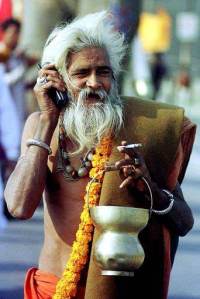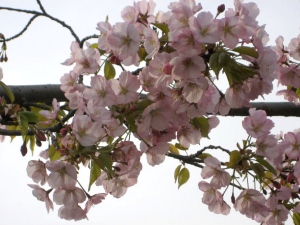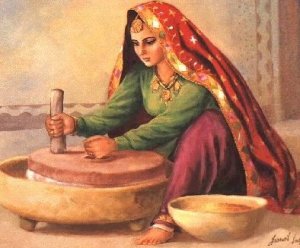साईं इतना दीजिये, जा में कुटुंब समाये
मैं भी भूखा ना रहूँ, साधू ना भूखा जाये
saayin itna dijiye, ja mein kutumb samaye
main bhi bhookha na rahoon, saadhu na bhookha jaye
Kutumb (family/household) is included in the idea of self for Kabeer. And not only does he feel responsibility towards his kutumb, but also towards the sadhu. My view of sadhus today is of the ash-smeared, cell-phone toting, ganja-high people I saw by the dozen in Haridwar.
AFP photo
But I think Kabeer is referring to the original meaning of saadhu; the ascetic, the holy man, who had renounced the worldly living and was focused on the contemplation of the brahman. The guys who would eat whatever the people cared to offer them. If no body offered them anything, they would simply go hungry. Kabeer is clear that if he cares about anything other than his family, it is making sure that he can contribute in this worthwhile (to him) journey that the ascetic is undertaking.
In some ways, the simple life of Kabeer the cloth weaver could not have been much more than subsistence but his recognition of the fact that he still owed something to a charitable cause is noteworthy to me. And in fact, if I stretch if further and go by the whole world is one kutumb philosophy, which likely Kabeer was highly familiar with, it may be that Kabeer is actually including the global village in his idea of the self.
I guess the important thing to me is that the message of this doha is very relevant today as we are constantly trying to define what is enough for us. We are running after a number of things, dividing our time between activities, slicing our attention to achieve more and more. We plan, we optimize, we improvise. But, when do we know that we are doing enough. That we have got enough. That we are on the way to a life of ‘enoughness.’
Clearly, we know that there is a lower bound. If we choose to do nothing at all, the joy of pursuit of happiness is lost. But my question is about the upper bound. When does the pursuit overtake the joy?
If I use Kabeer’s intuitive wisdom to answer this question, I would say that the critical component of identifying when it is enough, is to include in your idea of the self, your family, your extended family, even people and organizations who you value and who need your help. When I start thinking of their needs, and understanding that at the end of the day, we are all in this together, I lose some of my unreasonableness, and am closer to arriving at a good upper bound for myself.



